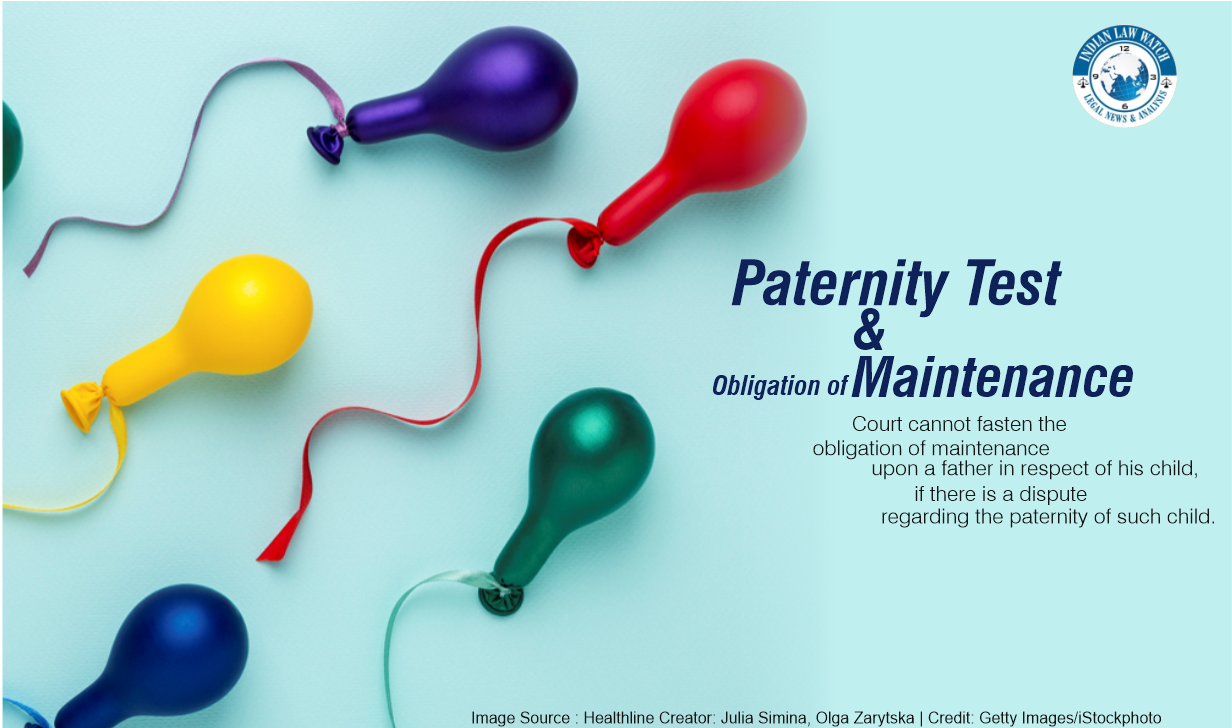

In Raaisha (minor) through her mother Sumaira v. Syed Sudhanshu Panday Crl. R. No. 16 of 2019, the J & K High Court held that the Court cannot fasten the obligation of maintenance upon a father in respect of his child, if there is a dispute regarding the paternity of such child.

In the instant case, the petitioner through her mother filed a civil suit for declaration regarding paternity and injunction against the respondent. The petitioner, through her mother, also filed a petition under section 488 of the J & K Criminal Procedure Code while seeking maintenance of ₹ 30,000 per month. In the said maintenance petition, the petitioner alleged that the respondent converted to Islam and married her mother and she was born within such wedlock. The petition further alleged that when respondent was transferred to New Delhi later, she along with her mother went to his native place where they found out that he is practicing Hindu faith, married to another woman and already has two children. The Magistrate ordered for the deferment of the maintenance proceedings until the conclusion of the civil suit. Such order of deferment passed by the Magistrate was challenged by way of revision before the J & K High Court.
Should maintenance proceedings be deferred until the paternity of the child is proved?
The J & K High Court observed that when there is a serious dispute as to the paternity of the child, it is not appropriate to impose the obligation of maintenance without first deciding the paternity issue. The Court placed reliance on Ahmad Ullah Kundji v. Humaria 1986 KLJ 485 as also the judgments of wherein the Court did not emphasize on providing the relief of maintenance before resolving the dispute regarding the paternity of the child. Instead the Court first decided whether the petitioner and the respondent’s mother had access to each other when the child might have been begotten.
Birth certificate obtained in regular course v. Birth certificate obtained through Court
In the instant case, the petitioner’s mother produced a birth certificate in the name of ‘X’ and the respondent was named as the father of the petitioner in such certificate. This certificate was obtained through court after almost 3 years of the birth of the petitioner. The respondent, on the other hand, produced a birth certificate in the name of ‘Y’ in which Mr. Idrees was named as the father of the petitioner. The respondent obtained this certificate from the Registrar of Births and Deaths, Srinagar and it was issued within one and a half months of the birth of the child.
The J & K High Court attached the presumption of correctness as prescribed by section 114(e) of the Indian Evidence Act, 1872 that states judicial and official acts are done regularly and by placing reliance on K. Muthulakshmi v. K. Lakshmiammal. In the said case, it was observed that if the birth of a child is registered in the due course in an appropriate register and is based on spontaneous information within a reasonable time, then the presumption of correctness under section 114(e) of the Indian Evidence Act, 1872 shall be attracted. On the other hand, if the birth of a child is not registered as per the due course and on the orders of the Judicial Magistrate, such presumption of correctness shall not be attracted.
Section 112 of the Indian Evidence Act, 1872
The Evidence Act is also attracted to the facts of the instant case. As per the provision of Section 112 of Indian Evidence Act, the fact that any person was born during the continuance of a valid marriage between his mother and any man, or within two hundred and eighty days after is dissolution, the mother remaining unmarried, is conclusive proof that he is the legitimate son of that man, unless it is shown that the parties to the marriage had no access to each other. The girl child (petitioner herein) to whom the petitioner’s mother has given birth, was born within two hundred and eighty days i.e, the date of dissolution of her marriage with Idrees. Thus, there is a presumption that the petitioner was born out of wedlock of her mother with Mr. Idrees, unless it is shown that Mr. Idrees had no access to the mother of petitioner during this period. Therefore, the Court also assumed the paternity of child to Mr. Idrees. Further, the petitioner’s failure to produce nikahnama and talaknama of her mother and respondent also exhausts the probability of rebuttal of such presumption.

There can be no dispute to the proposition that grant of maintenance to a minor child should be the paramount consideration for a Magistrate dealing with a petition under Section 125 of Cr.P.C, but when the paternity of a child is seriously disputed and there is no prima facie material to suggest that the respondent happens to be the father of the child, it would not be prudent for a Magistrate to fasten the respondent with the liability of maintaining the child without first ascertaining the veracity of claim of the petitioner.





